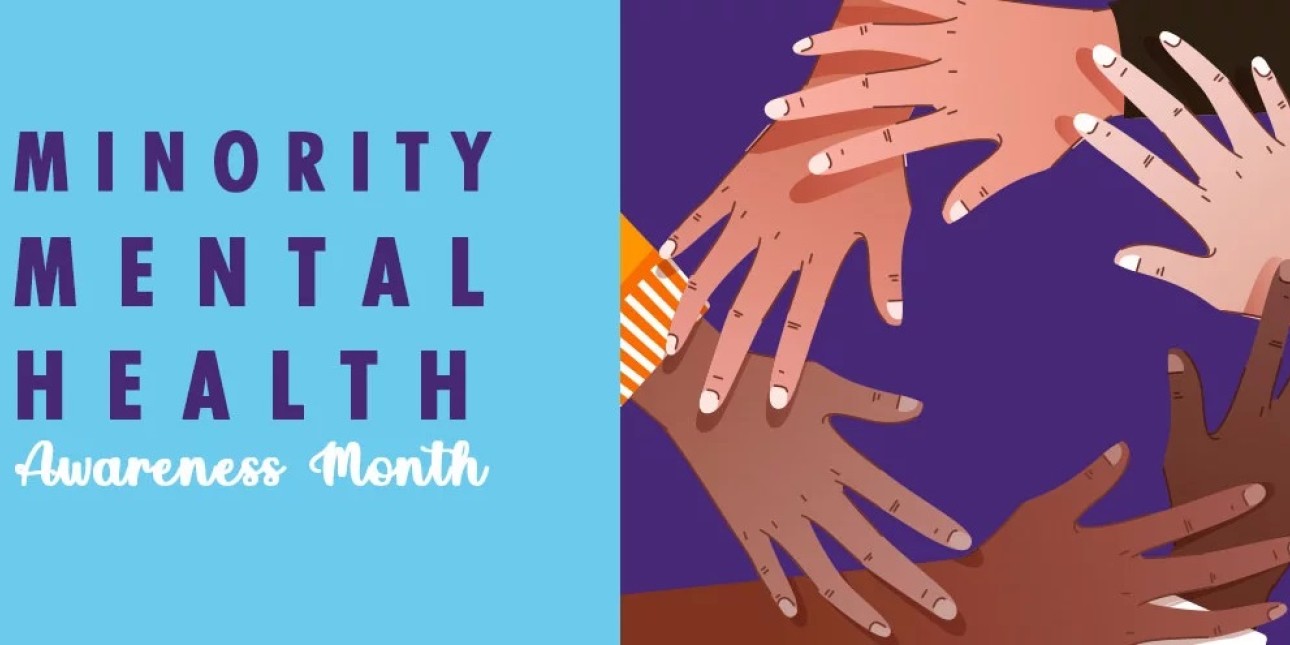The Importance of Minority Mental Health

It’s evident that America’s current mental health system is flawed and negatively impacts some groups more than others. This is why campaigns this month are vital to focus awareness and advocacy efforts on the mental health needs of minority populations. Founded by Bebe Moore Campbell in 2008, Minority Mental Health Awareness Month was made national to bring awareness and support to eliminate the health disparities that affect minority and marginalized communities. This mission still holds today, as we continue highlighting the mental health injustices and struggles in BIPOC and minority groups.
Importance & Barriers to Mental Health Care
According to the National Institute on Mental Health, nearly one in five people annually suffer from a diagnosable mental health condition. And as mentioned by the U.S. Department of Health & Human Services (DHHS), the sad reality is that minority populations among this statistic are less likely to receive a proper diagnosis or access to mental health services, let alone adequate treatment. Why is this the case? For many reasons, actually:
- One being the cultural stigma surrounding minority groups and mental health. In my experience (as a child of two immigrants), factors such as fear, embarrassment, and lack of trust in providers typically make it hard for minority groups to seek professional help. Some see suffering from a mental illness as a shameful handicap rather than what it actually is; an illness that needs to be treated, just like any other physical illness. Taking care of our mental health is natural and essential to our well-being, NOT shameful.
- And those who do choose to seek treatment often receive insufficient care or aren’t taken seriously. Data from the Bureau of Labor Statistics found that 88% of mental health counselors were white. This lack of diversity among providers results in the decreased understanding of different mental health needs across minority groups.
- Lack of insurance coverage also acts as a barrier to receiving access to mental health care. According to the National Institute of Health (NIH), people of color are more likely to be uninsured throughout their adult life, making it harder to pay for adequate mental health services. Factoring in these limited financial resources, we must begin to consider the following logistical barriers as well:
- Difficulties finding time off work
- Child care assistance
- Problems finding transportation to and from appointments
And if marginalized groups, through all this, still try to receive care without insurance, they’re left with unaffordable medical bills to take care of. As a result of these barriers, studies provided by the NIH mention that racial minority groups show higher levels of mental illnesses such as: depression, anxiety, and, PTSD. The deep-rooted prejudice, discrimination, and oppression against these groups exacerbate this statistic. It’s important to note that many of those factors that gravely impact the mental health of minorities have also been amplified during the Covid-19 pandemic.
The fact of the matter is our current mental health system fails to cater to all demographics needs equally, and as a result, minorities’ mental health and peace are at risk. Mental health disorders don’t discriminate based on a person’s race or demographics; they can affect anyone. So why is receiving adequate health care and resources dependent on a patient’s identity and background? It shouldn’t be this way. And with some help from all of us, that can begin to change!
How We Can Help
It is essential to understand the distinct mental health challenges underserved groups face, but it’s also imperative to do something to help change it! You can help destigmatize mental illness and raise awareness in many ways. For starters:
- Advocate and support mental health policies that will positively impact and center traditionally marginalized groups
- Share awareness images, and social media posts surrounding the matter
- Educate yourself and others if capacity allows
- Talk openly about mental health, and show compassion rather than judgment
- Identify and work through your own implicit biases
And for the BIPOC and marginalized community especially, we must make sure to take this time to focus and take care of ourselves! As much as work needs to be done to instill change in our mental health system, it’s also vital to remember that there are still things we can do ourselves to protect our peace. Engage in self-care activities that relax you. Meditate, unwind, take a break from social media, and/or practice mindfulness and positive thinking. Do what makes YOU happy, and remember that you are seen, heard, and loved!
Happy Minority Mental Health Awareness Month everyone. Let’s make this month a time for impactful change, growth, and remembering community!
Resources
Navigate a list of resources for underrepresented communities to improve your mental health!
- Mental Health Resources for Underrepresented Communities
- Wellness Tools from the Black Emotional and Mental Health Collective
- From Choosing Therapy:
- Choosing Therapy's Therapist Directory: This directory includes a filter to find therapists who specialize in BIPOC issues, as well as therapists who identify as BIPOC themselves. It’s a valuable tool for anyone in the BIPOC community seeking professional help.
- Best Online Therapy Services
- Best Online Psychiatrist Options
About the Author
Toyin (she/her) is a mental health and human trafficking prevention supporter. She spends her spare time helping tutor first time English learners, and advocates for youth impacted by the foster care and homeless systems. Toyin is a first generation student whose parents immigrated to the U.S. with the hopes of giving their children a better chance at life and opportunity. She's currently a Youth Catalyst Team-Girls Action Board consultant for Youth Collaboratory, and a sophomore at the University of Connecticut. She aspires to eventually become a Physician's Assistant, and open up her own medical practice!


